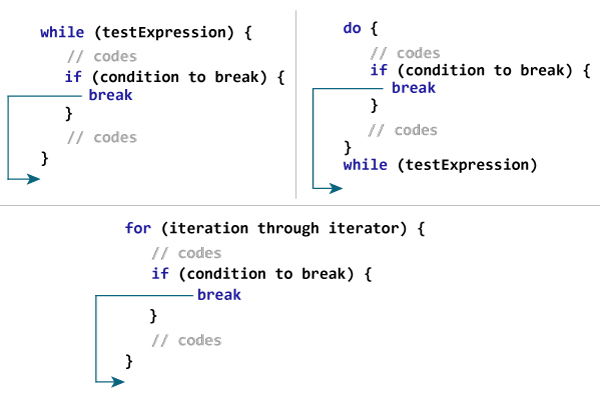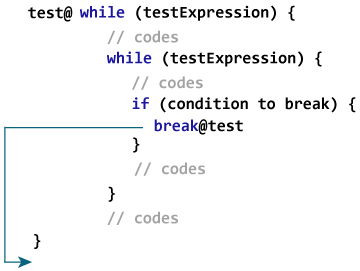Break While Loop and Continue Kotlin
Suppose you are working with loops. It is sometimes desirable to terminate the loop immediately without checking the test expression.
In such case, break is used. It terminates the nearest enclosing loop when encountered (without checking the test expression). This is similar to how break statement works in Java.
How break works?
It is almost always used with if..else construct. For example,
for (...) { if (testExpression) { break } } If testExpression is evaluated to true, break is executed which terminates the for loop.

Example: Kotlin break
fun main(args: Array<String>) { for (i in 1..10) { if (i == 5) { break } println(i) } } When you run the program, the output will be:
1 2 3 4
When the value of i is equal to 5, expression i == 5 inside if is evaluated to true, and break is executed. This terminates the for loop.
Example: Calculate Sum Until User enters 0
The program below calculates the sum of numbers entered by the user until user enters 0.
Visit Kotlin Basic Input Output to learn more on how to take input from the user.
fun main(args: Array<String>) { var sum = 0 var number: Int while (true) { print("Enter a number: ") number = readLine()!!.toInt() if (number == 0) break sum += number } print("sum = $sum") } When you run the program, the output will be:
Enter a number: 4 Enter a number: 12 Enter a number: 6 Enter a number: -9 Enter a number: 0 sum = 13
In the above program, the test expression of the while loop is always true.
Here, the while loop runs until user enters 0. When user inputs 0, break is executed which terminates the while loop.
Kotlin Labeled break
What you have learned till now is an unlabeled form of break, which terminates the nearest enclosing loop. There is another way break can be used (labeled form) to terminate the desired loop (can be an outer loop).
How labeled break works?

Label in Kotlin starts with an identifier which is followed by @.
Here, test@ is a label marked at the outer while loop. Now, by using break with a label (break@test in this case), you can break the specific loop.
Here's an example:
fun main(args: Array<String>) { first@ for (i in 1..4) { second@ for (j in 1..2) { println("i = $i; j = $j") if (i == 2) break@first } } } When you run the program, the output will be:
i = 1; j = 1 i = 1; j = 2 i = 2; j = 1
Here, when i == 2 expression is evaluated to true, break@first is executed which terminates the loop marked with label first@.
Here's a little variation of the above program.
In the program below, break terminates the loop marked with label @second.
fun main(args: Array<String>) { first@ for (i in 1..4) { second@ for (j in 1..2) { println("i = $i; j = $j") if (i == 2) break@second } } } When you run the program, the output will be:
i = 1; j = 1 i = 1; j = 2 i = 2; j = 1 i = 3; j = 1 i = 3; j = 2 i = 4; j = 1 i = 4; j = 2
Note: Since, break is used to terminate the innermost loop in this program, it is not necessary to use labeled break in this case.
There are 3 structural jump expressions in Kotlin: break, continue and return. To learn about continue and return expression, visit:
- Kotlin continue
- Kotlin function
Source: https://www.programiz.com/kotlin-programming/break
0 Response to "Break While Loop and Continue Kotlin"
ارسال یک نظر